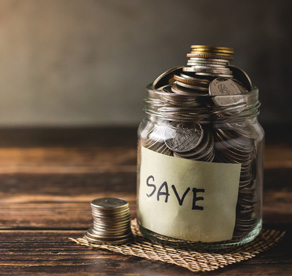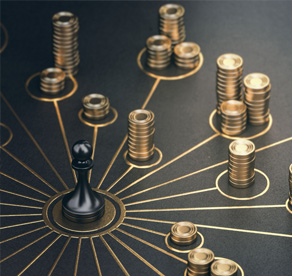Body
Saving and investment products are not just ways to increase your wealth; they are essential to protect your wealth. Your money becomes less valuable over time due to inflation. Savings products should be used to maintain or improve your financial situation. Saving is also important to pay off ongoing debts, make big life purchases and enjoy financial freedom.
Budget planning
A fundamental part of growing your savings is using a monthly budget. You can plan how much you can afford to realistically save by accurately calculating a budget. The budget should include all of your expenses, typically separated as essentials such as rent, mortgage, groceries, and non-essential expenses. You’ll also need to calculate your income, such as employment income, pension income and savings interest.
Once you’ve made your budget, it is crucial that you continue to monitor it and adapt it to any changes. Most people make a budget but do not update it regularly enough, which means it becomes inaccurate and less effective.
Can you afford to save?
You may realise that there is no, or very little disposable income left at the end of each month. Thus, you have no leftover money to save. In this case, it may be worthwhile to identify areas where you can save money, rather than identifying an amount of money you can comfortably save. You may choose to stop paying for one of your non-essential expenses, such as an extra streaming service.
Reducing your non-essential expenses should not be overlooked as a great saving strategy for those with minimal disposable income living pay packet to pay packet.
Saving or paying off debt
If you have disposable income but also have ongoing credit that needs to be repaid (e.g., loans and credit cards), you may be unsure if you should pay off the credit or save. For most people, it will be advantageous to pay off existing credit before saving because the interest on a loan or credit card will likely be higher than the interest you would receive from a savings account.
Paying off existing credit also decreases your chance of defaulting on payments and having a more serious debt problem. If you have multiple credit debt, you may want to consider a debt solutions strategy.
Note, there may be mitigating factors that affect these decisions and you may want to consult with a professional financial adviser first.
Getting into the savings habit
When you first start saving, it can be difficult to keep up with good savings habits. Once you see the results and your savings increase, it generally gives you more motivation to keep saving effectively. There are tips and tricks you can use to stick with your savings habits, such as only spending in cash to keep on top of your spending. This can limit the chances of going back to bad spending habits.
Choosing between borrowing and savings
Borrowing money from a creditor can be the more attractive way to make a purchase, rather than saving up to pay for it with our own money. Doing so will cause you to pay more for the product, experience, or service than if you took the time to save yourself. Some people prefer to borrow and repay because they are more focused and motivated to meet repayments than they are to save. However, this still comes with the downside of paying more due to the interest and fees.
Is my money safe in a bank?
The FSCS protects up to £85,000 of the money you deposit into a regulated and authorised UK bank or building society. This protection guarantees to give back at least £85,000 if the financial institution collapses and goes out of business. You may get back more if you have over this amount with one bank, but only the first £85,000 is absolutely guaranteed.
If you have a joint account, the level of cover doubles to £170,000. If you have accounts with different banks or financial institutions, you are protected up to £85,000 with each institution.
Savings interest rates
When we save money with a bank or financial institution, we should deposit our money into savings products that pay us monthly or annual interest. For example, we may put our money into a savings account paying 3% interest. This means over the course of a year the provider would pay us an additional 3% of the money we deposited over that term. This is an example only and interest rates are subject to change.
Types of savings accounts
There are different types of savings accounts to consider:
- Easy access accounts that allow you to access your money at any time without penalty.
- Fixed-rate bonds where you deposit a lump sum and the money is locked away for a set period, usually with a higher interest rate.
- ISAs are a tax-efficient way to save over many years.
- Stocks and shares ISAs, which put your capital at risk just like an investment product.
- Other investment opportunities
What is inflation?
In economic terms, inflation is the constant increase in living expenses or the decline of a fiat currency’s value. Over time, products and services become more expensive. Regular wage increases are supposed to level out any rises in living costs, but when this does not happen our money does not stretch as far, making it harder to save.
Inflation also affects the money we have already saved. Constant rising costs in living expenses mean any money we have saved is decreasing in value if it is not earning equivalent or more interest than the rate of inflation. For example, if inflation is at 3% and we have put our savings into a savings account paying below 3% interest, the money saved is decreasing in value.
Saving money for special occasions
Saving money for one-off or special occasions such as a holiday or wedding is a great way to get into a saving habit. These relatively short-term savings goals can keep you motivated to save. You may want to open a dedicated savings account to meet your savings goal, and you should update your monthly budget to help achieve it.
Saving for your children
If you want to save money for your children, you should open a children’s savings account in their name. You’ll still have control of the money until you hand it over or until they reach a certain age.
Savings with a credit union
You may prefer to save with a credit union, which is a smaller financial organisation offering savings accounts. Saving with a credit union can be different with some unions offering account holders a dividend payment rather than interest payments. The dividend may be more lucrative than high-street bank interest rates, but it may not be guaranteed. Therefore, there can be an element of risk in choosing a savings account with a credit union. Your capital is generally not at risk.
Savings scams
Be aware of saving schemes that sound too good to be true as they usually are. There are many savings scams around promoting big gains in short periods. Always do your research or consult with a financial adviser for safety and assurance.








